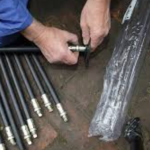Unless a boiler breaks down, we don’t tend to give them much thought. When we want hot water or heating, we just flick a switch and expect that everything will work as we want it to. However, it can be a good idea to know a little about what goes on with your central heating system as this can help to identify when a problem might be occurring. For an Emergency Plumber Cheltenham, visit https://www.hprservicesltd.com/cheltenham-boilers/boiler-repair-cheltenham/
The boiler is really the beating heart of your home’s central heating system. It is responsible for pumping hot water to your radiators and taps when you need it. A regular gas boiler is attached to a main gas pipe which provides a continuous supply to a property. Sometimes a property may use Liquid Gas Petroleum canisters which will need to be refilled from time to time.

When you turn the boiler on, a valve opens inside the unit to allow the gas to enter the sealed combustion chamber. Some kind of electrical ignition or pilot will then ignite the gas to begin burning the fuel that will heat the radiators and water.
Water flows over a heat exchanger which heats it up and then a pump propels the water around the pipes in your home that travel to each of the radiators. Modern boilers tend to be of the condenser variety. This system reduces the amount of heat from the burning fuel and recycles the latent heat from vapour which occurs as a by-product of the heating exchange. It is this heat that is then used to warm up the water. This system helps to reduce energy wastage and by law, all new boilers installed must be condenser boilers.
So, which type of boiler might be best for your home?
Combi – This is a popular system as it requires no tanks or cylinders, freeing up space. The boiler unit contains two individual heat exchangers with one for the hot water and one for the hot water needed for the radiators. The benefit is that the system is always on standby so hot water is available as soon as you need it. The only downside is that the boiler has a directional switch to request one or the other so you can’t run both at the same time.

Conventional – This is a traditional heating system that requires a cold water tank and a tank for storing hot water. There is also a requirement for an expansion tank that allows cold water in to regulate the levels of water. It is necessary to cope with the expansion from heated water and to replace the water lost through evaporation or leakage, for example.
System boilers – This system needs an additional hot water cylinder. The system works in a similar way to a conventional system but without as many tanks as many of the heating parts are built into the cylinder. It operates as a sealed pressurised system in which cold water is drawn in from the mains, heated and then sent to the hot water storage tank.














